

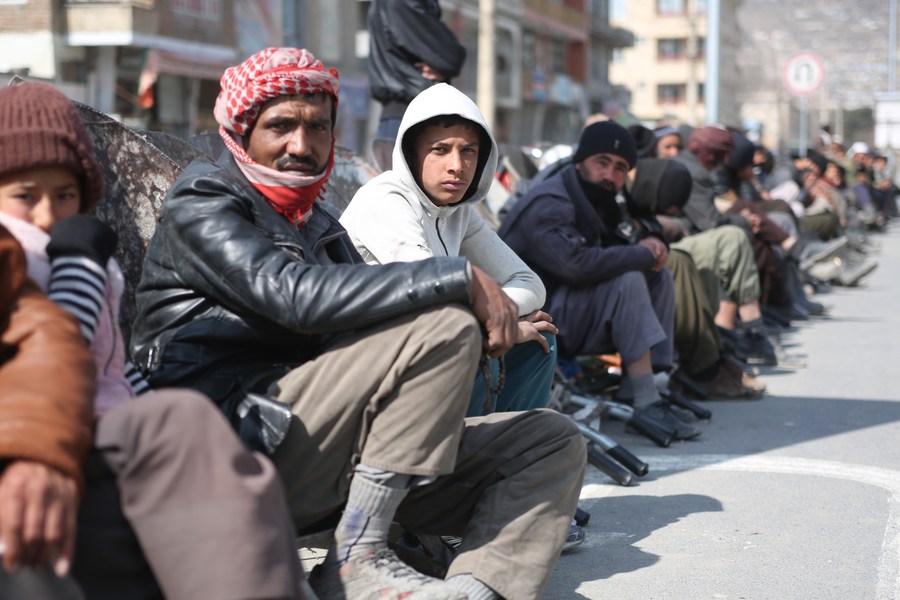
UNITED NATIONS - A Chinese envoy said Thursday that helping Afghanistan ease the humanitarian and economic crises is the top priority for the international community.
Since the withdrawal of foreign troops last August, Afghanistan has ushered in a critical phase of peaceful reconstruction. China supports the important role of the United Nations in Afghan and welcomes the mandate renewal of the UN Assistance Mission in Afghanistan (UNAMA) to enable it to provide assistance for the peace, stability and development of Afghanistan, said Zhang Jun, China's permanent representative to the United Nations.
In an explanation of vote after the vote on the mandate renewal, Zhang said helping Afghanistan ease the humanitarian and economic crises is the most urgent task at present, and should be the most important work of UNAMA in the coming period.
UNAMA should actively implement its mandate, urge major donors to increase aid without political preconditions, and help Afghanistan improve people's livelihood, he said. "We expect UNAMA to assist Afghanistan in cooperating with international financial institutions to gradually activate Afghanistan's commercial and financial activities and promote economic and social development."
The Security Council resolution specifies that Afghan assets belong to the Afghan people, which reflects the common view of the international community. In line with the clear mandate from the Security Council, UNAMA should further coordinate the unfreezing of Afghanistan's overseas assets. China calls on the expeditious unfreezing of Afghan assets and the unconditional return of these assets to the Afghan people, said Zhang.
The de-facto authorities in Afghan are actively conducting foreign relations and taking measures to respond to the expectations of the international community. The general direction is correct. The international community should adhere to the Afghan-led and Afghan-owned principle, strengthen contacts with the Afghan interim government and all other parties, activity guide and promote the establishment of an open and inclusive political structure, and gradually restore order, rule of law and economic development, he said.
The international community should support Afghanistan in increasing investment in education and health, protecting the basic rights of all people, including women and children, combating terrorism in all its forms, and developing friendly cooperation with other countries, he added.
This time, the Security Council significantly reprioritized UNAMA's mandate in light of the changing situation on the ground. As the situation is unfolding too fast and filled with many uncertainties, it is not an easy task to ensure that the new mandate fits the latest developments, meets the real needs of the Afghan people, and is practical and feasible to implement, said Zhang.
He asked Security Council members to take stock of UNAMA's future work in a timely fashion and be ready to make new adjustments at any time.
Always respecting the sovereignty and leadership of Afghanistan, UNAMA should pay attention to the legitimate concerns of the Afghan interim government and carry out various tasks on the basis of active communication and mutual understanding, he said.
For a long time, the neighbors of Afghanistan and regional countries have actively supported Afghanistan in its peace, reconciliation and reconstruction process, and made great efforts to promote its peaceful development. China is making preparations for the third meeting of foreign ministers of Afghanistan's neighbors, and is ready to promote communication and coordination of regional countries so as to create a favorable environment for the stability and reconstruction in Afghanistan, said Zhang.

KABUL - Deputy Prime Minister of Afghan caretaker government Mullah Abdul Ghani Baradar has called on Afghan investors to return to the country, the government said on Friday.
He made the remarks at the Afghan National Private Sector Conference held in Kabul on Thursday, the government said in a statement.
"Baradar called on Afghan investors living abroad to return to the country and invest here, as security of investors and their assets will be guaranteed," the statement said.
"International sanctions are being eased day by day and we are trying to provide more facilities in industry, trade and investment, and efforts are being made to improve the economic situation," Baradar was quoted as saying.
On Tuesday, the World Bank board of directors decided to unfreeze $1 billion of the Afghanistan Reconstruction Trust Fund which was frozen after the Taliban's takeover on Aug 15, 2021, according to Da Afghanistan Bank (DAB), the country's central bank.
The DAB welcomed the move by the World Bank as a goodwill gesture, calling for further cooperation with the global financial institution in the Afghan banking and financial sectors, according to a statement of DAB.
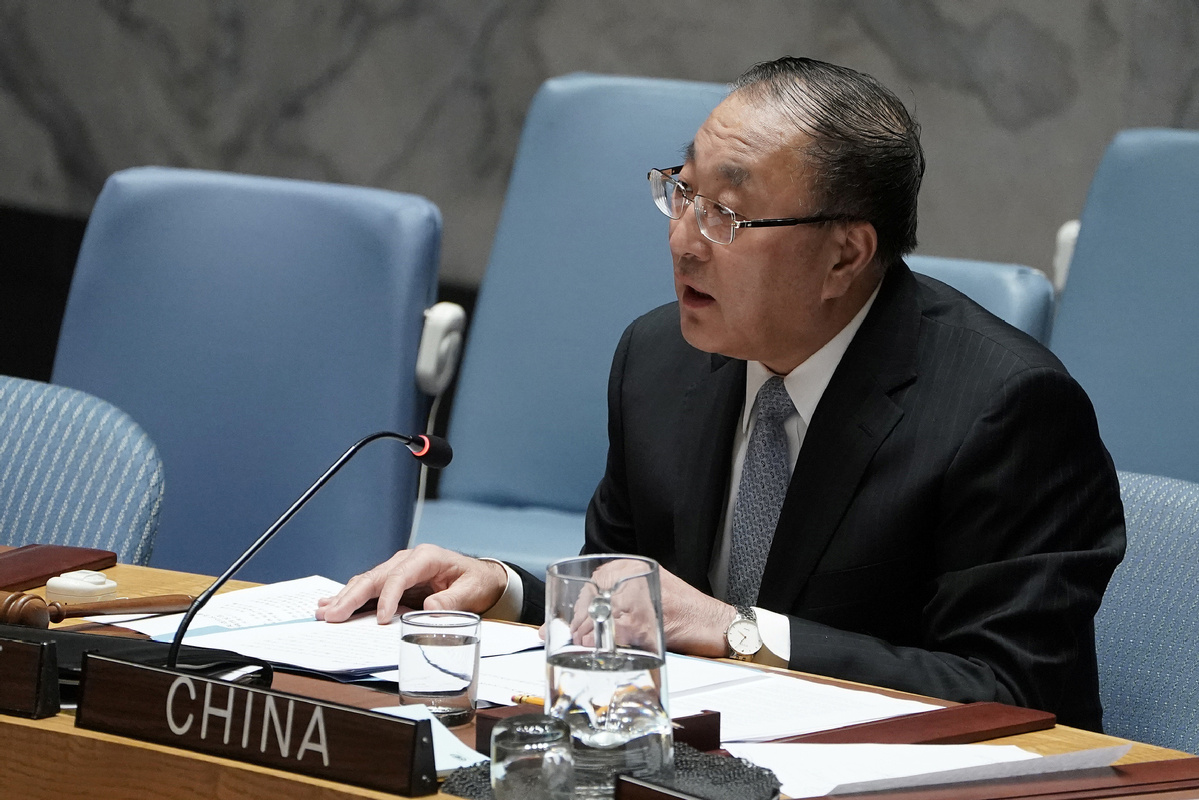
UNITED NATIONS -- The US misappropriation of frozen Afghan assets while the Asian country is facing an avalanche of hunger and poverty is inhumane, said a Chinese envoy on Wednesday.
Against the backdrop of such a grim humanitarian and economic situation, the US government decided last month to divert $7 billion in frozen Afghan assets for other purposes, which triggered widespread protests across Afghanistan, said Zhang Jun, China's permanent representative to the United Nations.
Noting that those assets belong to the Afghan people and the sovereign state of Afghanistan, Zhang stressed that the practice of arbitrarily handling other countries' overseas assets under US domestic law has no precedent. It is not only an infringement on Afghanistan's sovereignty and property, but also a serious contravention of international law, he said.
The envoy pointed out that those funds are the only few available assets owned by Afghanistan, playing a crucial part in the stability and development of the country. For the Afghan people, those assets are their life-saving money and their hope for survival. When Afghans need them the most, the ruthless deeds of freezing and misappropriation have inflicted "secondary damage" on them and that are completely against the due spirit of morality and justice.
What the United States has done is illegal, unreasonable and inhumane, he said, noting that China once again calls on related countries to immediately and unconditionally return those assets in full to the Afghan people, instead of making things worse. Moreover, the United States should stop applying double standards on humanitarian issues, Zhang added.
Afghanistan has going through a lot of trials and tribulations, and is now standing at a crucial stage of reconstruction. The country is working hard to improve its political structure, restore order in production and livelihood, and actively carry out foreign exchanges and cooperation. There is a good trend that more and more countries are engaging with the Afghan interim government in various forms, he said.
The international community should continue to adhere to the "Afghan-led, Afghan-owned" principle, step up engagement with the Taliban in an equitable, rational and pragmatic approach, and patiently guide the Taliban to respond to the expectations of the international community. Only in this way can Afghanistan gradually achieve lasting peace and stability and eliminate the breeding ground of terrorism. Afghan women and children can thus achieve better development, Zhang said.
As a friendly neighbor, China has always been committed to supporting the peaceful and stable development of Afghanistan. China will work closely with countries in the region, actively participate in various Afghan-related multilateral mechanisms, and promote coordinated actions by all parties to create synergy and help Afghanistan walk on a path of sound development, he said.
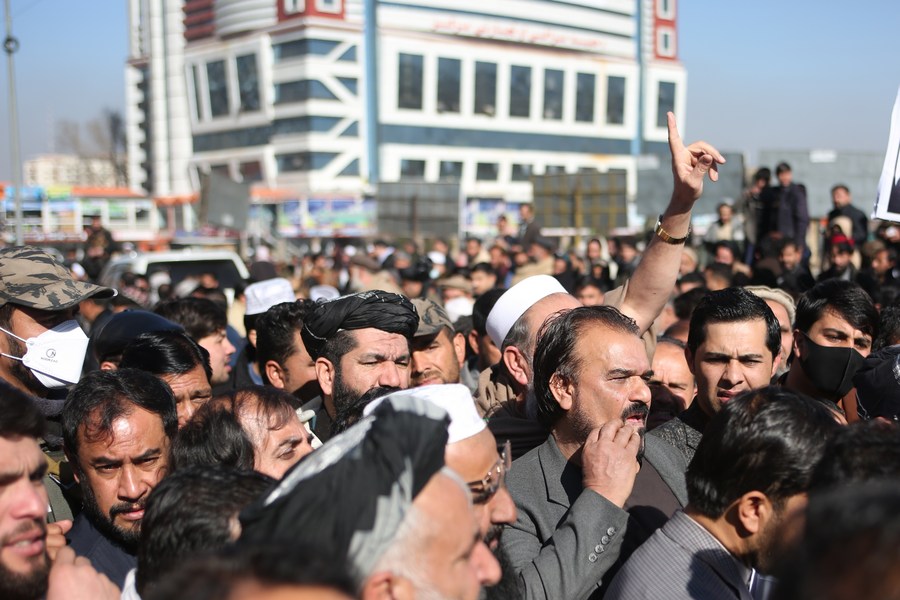
Former British foreign secretary David Miliband says it is the ordinary people of Afghanistan and not the Taliban who have suffered as a result of what he called the "catastrophic" handling of the international response to the crisis in the country.
Since the withdrawal of United States forces from the country last summer, it has fallen back under the control of the fundamentalist group, with sanctions brought in against them leading to mass starvation through a bitterly cold winter.
"If we wanted to create a failed state we could not have a more effective policy mix than the one we have at the moment," Miliband, who is now chief executive of the International Rescue Committee aid agency, told The Guardian.
"What we are doing is not making it worse for the Taliban, it is making it worse for the people. We are not punishing the Taliban. It is ordinary Afghans that are paying the price of peace. It is not just a catastrophe of choice, but a catastrophe of reputation. This is a starvation policy."
In November, the World Bank said it was unlikely to resume sending direct aid to the Afghan health sector, something that had been transformed over the previous 20 years, because of concern at how the Taliban would handle the money which had been funding more than three-fifths of the country's healthcare facilities, including paying wages.
World Bank chief David Malpass said he could not envisage the organization getting involved because of what he called the "full breakdown" of the Afghan economy, also citing concern at the presence of several people within the Taliban regime who are the subject of international sanctions.
"The Taliban do not know anything and have zero knowledge about health or how this works," a doctor in Kabul identified only as Mina told the Daily Telegraph. "There is a catastrophic crisis and the world doesn't know."
An article in The New Yorker magazine published in January this year said that when US forces pulled out of the country, just 17 percent of Afghanistan's health clinics were functional, and Miliband said some medical staff have not been paid for nearly a year.
World Food Programme director David Beasley said the "'international community … has done a disastrous job here", and echoed Miliband's calls for World Bank to release up to 1 billion pounds ($1.36 billion) of aid that has been frozen, to allow the country's economic system to come back to life.
"I simply do not understand the lack of urgency to get this thing moving," said Miliband. "It genuinely befuddles me that we should have allowed this to get so much worse so quickly.
"In these tragic circumstances you can give more aid until you are blue in the face, and it will not solve the structural problems. I am in the ridiculous position of running an aid agency and I am saying 'don't just give out humanitarian aid, you have to underpin the economy'".
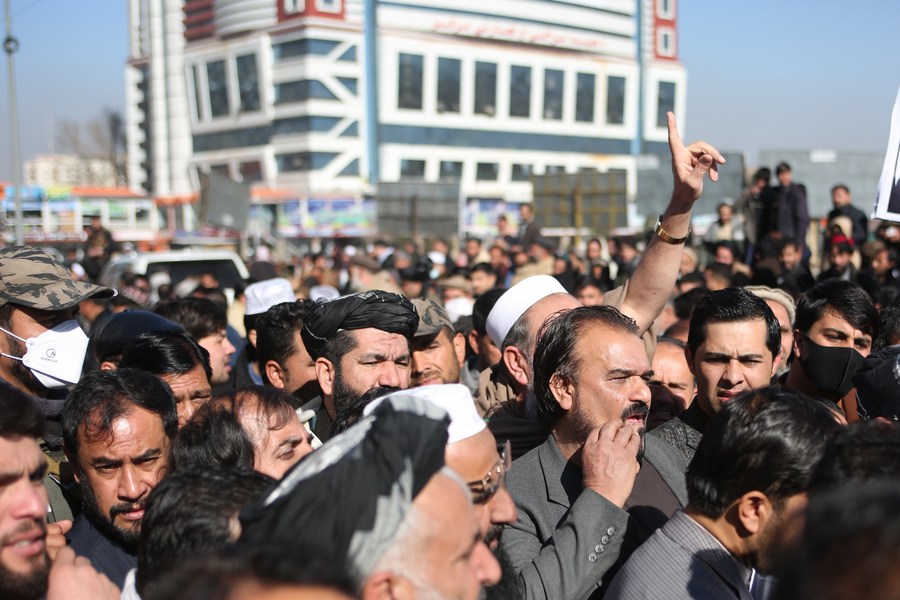
With Turkey, Qatar cooperation, links to Kabul can help ease crisis, experts say
Management assistance from Turkey and Qatar to keep Kabul's airport open will help Afghanistan stay connected with the world and stabilize the flow of aid to Afghans enduring a humanitarian crisis, experts said.
The agreement is also expected to boost regional cooperation between Afghanistan and its other neighbors, as the Taliban-the nation's caretaker government since August last year-seek official recognition and investments in rebuilding the nation following the chaotic withdrawal of US troops last year. The ratification of the agreement has been welcomed across the region.
Farhan Mujahid Chak, an associate professor of political science at Qatar University with a focus on the Gulf, said the arrangement for Qatar and Turkey to jointly manage the Afghan capital's airport "reflects the mature, shared strategic vision "of both countries. The ratification of the agreement, he said, would give the Taliban's recent diplomatic push "considerable momentum".
"Having just returned from successful talks in Norway, the Taliban's continuous appeal for recognition and humanitarian support, especially as they face a food and health crisis, should not be ignored by the international community," Chak told China Daily. "Moreover, humanitarian aid to the country at this critical juncture should not be politicized.
"Hence, the immediate consequence of the agreement, and its importance, are of monumental significance."
In a statement on Jan 27, Qatar's Ministry of Foreign Affairs said that its delegation, together with Turkey and the Afghan interim government, concluded a tripartite meeting agreeing on the key issues required to manage and operate the Kabul International Airport, also known as the Hamid Karzai International Airport.
On Feb 2, Tolo News, a television network based in Kabul, reported that the governments of Afghanistan and Qatar had reached an agreement to establish direct flights between Kabul and Doha each week, settling disputes over a monthslong pause in flights.
Amina Khan, director of the Centre for Afghanistan, Middle East and Africa at the Institute of Strategic Studies in Islamabad, said the airport deal is not just about looking after the security of the airport as it involves a security framework for the airport mission in itself.
However, she said there are questions over other aspects of the agreement, such as financing.
"In one way (the deal) is good because the Taliban obviously do not have the expertise nor the money to deal with or look after the airport," Khan told China Daily.
Khan noted that the US, the United Kingdom, and several other European countries have shifted their embassies to Qatar where they have been engaging with the Taliban through their missions there.
Willingness showed
"In fact, (with Qatar and Turkey having taken this role), it also shows that there is a willingness from the international community to engage with Taliban through Qatar," she said.
Afghanistan's humanitarian situation has deteriorated drastically since August last year when international aid came to a sudden halt after the Taliban takeover following 20 years of Western occupation.
In January, the United Nations and its partners launched a funding appeal of more than $5 billion for Afghanistan, in the hope of averting a collapse in basic services. Some 22 million Afghans need assistance inside the country, with 5.7 million more outside the country requiring help.
Mehmet Rakipoglu, a Gulf and Middle East expert and researcher at Sakarya University Middle East Institute, said that opening the Kabul airport does not solve the structural problems that Afghanistan has been suffering from.
The invasion of the US damaged the country's infrastructure. The US altered not only the balance of power in the country but also tried to construct a government that is pro-Western and responsible for the catastrophe, Rakipoglu told China Daily.
Xinhua contributed to this story.
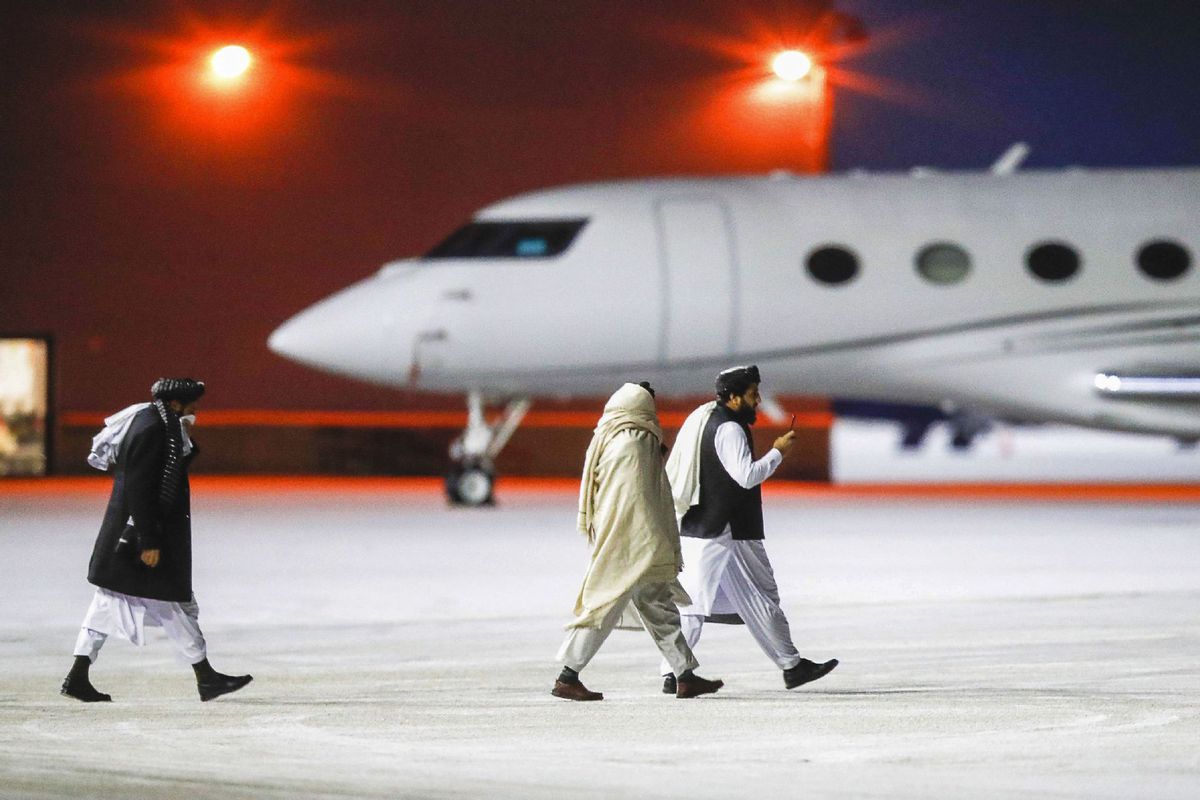
On their first visit to Europe since returning to power, the Taliban have held landmark talks with Western diplomats in Oslo on Monday over the humanitarian crisis in Afghanistan, a meeting the Afghan delegation called an "achievement in itself".
Having accepted an invitation from Norway, the Taliban were meeting with representatives of the United States, France, the United Kingdom, Germany, Italy, the European Union and Norway on Tuesday, the final day of three-day closed-door discussions.
The Taliban delegation was led by Mullah Amir Khan Muttaqi, the country's acting foreign minister, who hailed the fact that the meeting took place as a success in its own right.
"Norway providing us this opportunity is an achievement in itself because we shared the stage with the world," Muttaqi told reporters on Monday.
"From these meetings we are sure of getting support for Afghanistan's humanitarian, health and education sectors," he added.
Afghanistan's humanitarian situation has deteriorated drastically since last August when international aid came to a sudden halt after the Taliban takeover, the fall of the US-backed government and the withdrawal of Western troops after 20 years of occupation.
Hunger now threatens 23 million Afghans, or 55 percent of the population, according to the United Nations, which says it needs $4.4 billion from donor countries this year to address the crisis.
No country has yet recognized the Taliban government, which hopes that meetings of this kind will help legitimize their government, experts have said.
Norway's Foreign Minister Anniken Huitfeldt has stressed the talks would "not represent a legitimization or recognition of the Taliban", but because of the humanitarian emergency "we must talk to the de facto authorities in the country".
Meanwhile, Taliban spokesman Zabihullah Mujahid tweeted after their talks that "the participants recognized that understanding and joint cooperation are the only solutions".
Faced with the Taliban's request that nearly $10 billion frozen of assets by the US and other Western countries be released, Western powers have put the rights of women and girls in Afghanistan high on their agenda, along with the West's recurring demand for the Taliban administration to share power with Afghanistan's minority ethnic and religious groups.
Appeal for recognition
Last week, the caretaker government called on the international community to formally recognize the Taliban administration. Mullah Hassan Akhund, its acting prime minister, made his first major public appearance at an economic conference in Kabul on Jan 19 since he assumed the role in September.
Muttaqi as said that the Taliban government welcomes "leading international companies, governments and investors to invest in various sectors of Afghanistan".
Salman Bashir, former foreign secretary of Pakistan, said peace and stability at home and good cooperative relations with the international community, particularly with its immediate neighbors, are essential for starting the process of rebuilding Afghanistan after more than four decades of war.
"This requires a high degree of maturity by the Taliban government. Developing a solid national consensus within Afghanistan by providing all segments of the Afghan society an opportunity to participate in evolving such a consensus should be a priority," he said.
"The neighbors and the international community must also be assured that the Taliban government will not permit the soil of Afghanistan to be used for terrorism. It is on this basis that the international community will be inclined to support the Taliban government."
Amina Khan, director of the Centre for Afghanistan, Middle East and Africa at the Institute of Strategic Studies Islamabad in Pakistan, pointed out that the international community is already engaging with the Taliban.
However, she also thinks that the focus has now shifted toward human rights and women's rights and education. An understanding between the Taliban and the international community clearly exists, "provided that the Taliban adhere to those pledges of reforms that they have talked about such as human, women rights and of course, the counterterrorism assurances".
Engagement and cooperation "will eventually imply (a move) toward recognition", Bashir said. "For now, engagement and cooperation with the Taliban government by the international community is important. Everyone should help Afghanistan in becoming a normal state."
Agencies and Xinhua contributed to this story.
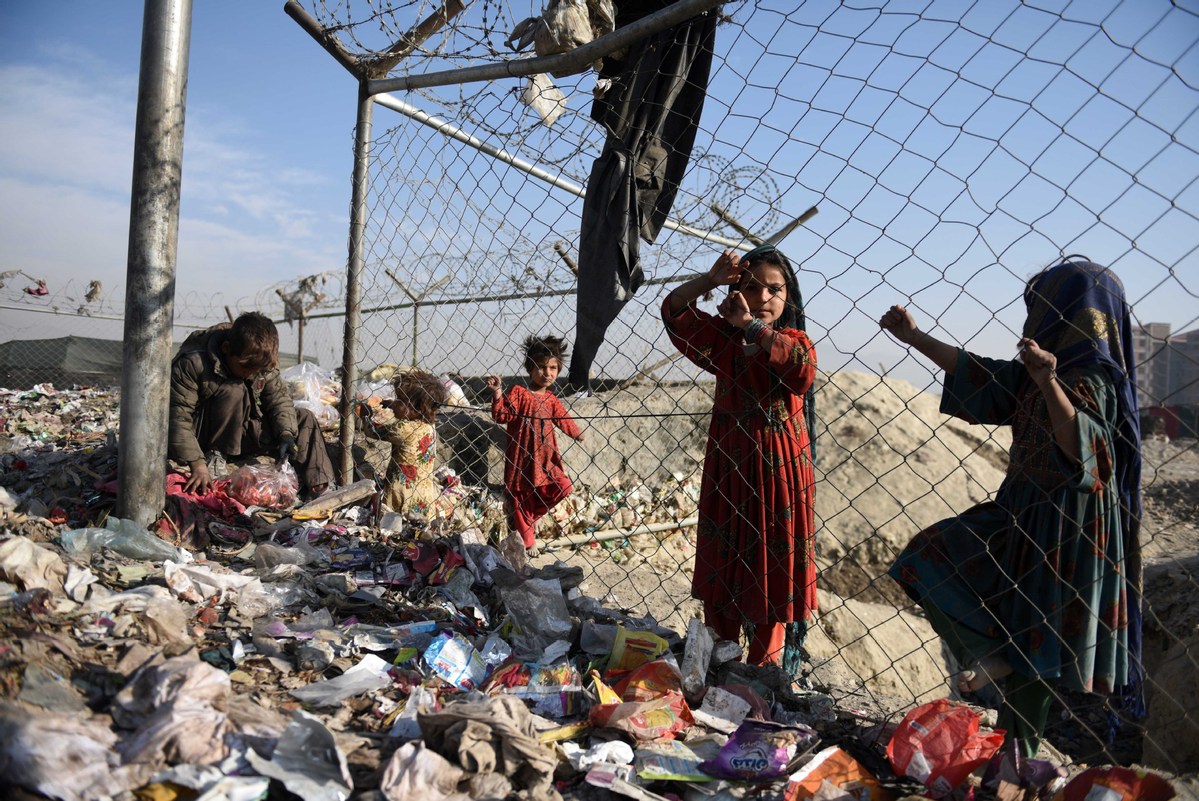
GENEVA - The people of Afghanistan are facing a profound humanitarian crisis that threatens the most basic of human rights, the Human Rights Council of the United Nations (UN) warned on Tuesday.
In an oral update on the human rights situation in Afghanistan, Nada Al-Nashif, UN deputy high commissioner for human rights, said that the situation in the war-torn country is further compounded by the impact of sanctions and the freezing of state assets.
"Economic life is largely paralyzed with the collapse of the banking system and a severe liquidity crisis," the UN official said. "With winter having arrived, women, men, boys and girls face severe poverty and hunger, and limited and deteriorating public services, particularly health care."
Al-Nashif told the Council that even before the Taliban takeover in August, this year had already seen the highest number of civilian casualties on record -- close to half of them women and children.
Although fighting has receded since August, Afghan civilians remain at risk of conflict, as lethal attacks are still being carried out by the Islamic State Khorasan Province and other armed groups.
She said the current situation leaves the population with little protection in terms of human rights. Women and girls in particular face great uncertainty with respect to the rights to education, livelihoods and participation, in which they had made important gains in the past two decades.
Al-Nashif cited the latest UN figures as saying that 60 percent of the 4.2 million Afghan children already out of school are girls, and that a further 8.8 million children are at risk of being deprived of education given the non-payment of teacher salaries and continuing school closures.
Among the many concerns, the UN official stressed the safety of Afghan judges, prosecutors and lawyers.
"The difficult policy choices that (UN) member states make at this critical juncture, to avert economic collapse, are literally life and death," she said.
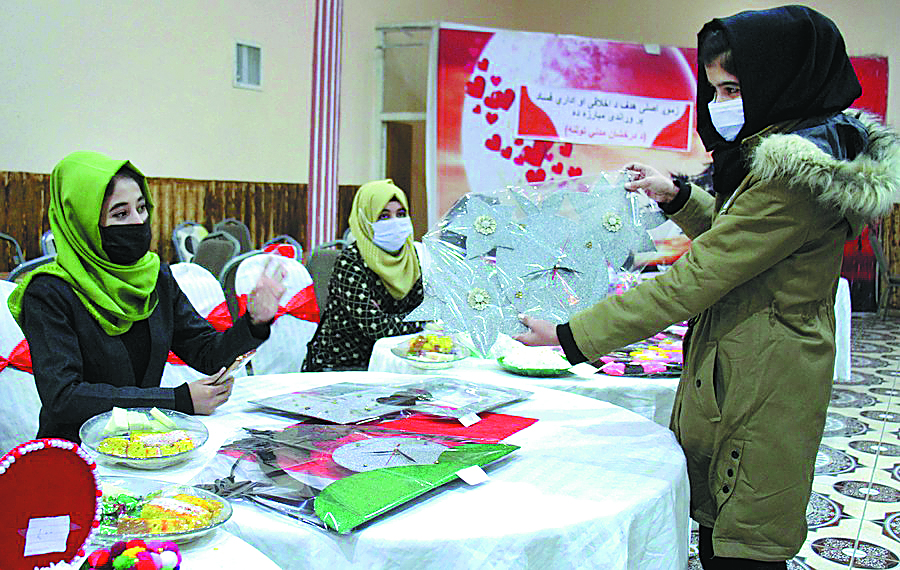
SHEBIRGHAN, Afghanistan-Making artificial flowers has made Afghans feel as if it is spring all year round, says Fariha, 22, a flower maker in Afghanistan's northern province of Jawzjan.
For the first time, a group of 30 flower makers, all females, have graduated from a vocational training program on the outskirts of the provincial capital Shebirghan since the Taliban's takeover of Afghanistan in mid-August.
One of them, Fariha, graduated from high school with the ambition of making flowers to support her family and opening a flower shop in the city.
The economy has deteriorated, with unemployment rising and more people struggling to make a living, though the security situation has remained generally calm.
"At this difficult time, as Afghanistan suffers from economic woes, the flower-making art helps young girls to make money and helps their families buy basic necessities," Fariha said.
"I have a good income of about 500 to 2,000 afghani (about $5-$20) from selling my daily products," said Fariha, now the breadwinner of her nine-member family.
The artificial flowers are mostly sold to wedding parties, the number of which has been rising recently, she said.
Zahra, another artificial flower maker in the same training program, said she joined it as soon as she graduated from high school a year ago. "Things have been difficult recently. … It gives me a very good feeling to make flowers and sell my own products, to make money."
Tutorial program
The five-month flower-making tutorial program, funded by an international nongovernmental organization, the Agency for Technical Cooperation and Development, and launched by the Darakhshan Civil Association, has enabled up to 50 Afghan women to learn the technique and make a living.
Some countries have accused the Taliban caretaker government of failing to remain inclusive and protect the rights of women.
The Taliban have said they respect women's rights more than the previous government.
This month the Taliban supreme leader Haibatullah Akhundzada issued a decree saying women and girls have their own choices of marriage, fixed share of heritage and property, and that no one can deprive them of their basic rights.
Xinhua

Chinese special envoy for Afghan affairs Yue Xiaoyong has wrapped up 112 days of shuttle visits to foreign countries, a hectic diplomatic schedule that highlights Beijing's active role in helping Afghanistan cope with critical changes.
From late July to November, despite the pandemic and security risks, Yue flew between Asia and Europe multiple times in efforts to bring peace and stability to the war-torn country. His travels took him to 15 countries where he engaged in frequent diplomatic exchanges with representatives from nearly 30 countries and international organizations.
China has made the most intensive diplomatic efforts of all countries involved in the Afghan issue, after the Taliban seized power in the central Asian nation and the United States completed the withdrawal of 2,500 troops in August, Yue said.
The veteran diplomat, with experience in US and Middle East issues, assumed the post in July, when he attended a meeting between State Councilor and Foreign Minister Wang Yi and a visiting Taliban delegation in Tianjin.
After he assumed the post, he made a total of 40 flights, including 11 visits to Qatar, five to Pakistan, four to Russia and three to Iran, to participate in bilateral and multilateral talks.
Yue said the key to the political settlement of the Afghan issue lies in rational and pragmatic contact, strengthened humanitarian assistance and constructive guidance based on mutual respect.
Sustainable peace, stability and reconstruction also have to be pursued in Afghanistan, he said.
When the country has undergone turbulence and change in the past, China has focused on the Afghan people and conducted equal and friendly exchanges with all parties, Yue said, which have laid a solid foundation for Beijing to deal with the current situation in the country.
During his trips the special envoy has met with Taliban officials many times. In October, State Councilor Wang Yi also met with representatives of the Taliban in Qatar for a second time.
While maintaining frequent contact with Afghanistan, China is also working with the country's neighbors to address related issues, remains open to dialogue with Western nations and voices its position at international platforms, Yue said.
A coordination and cooperation mechanism among Afghanistan's neighbors has been established, and foreign ministers of neighboring countries have held two meetings, with a third meeting due to be hosted by China next year.
Yue said major changes happening in Afghanistan and efforts made by many countries are not geopolitical issues or wrestling matches among major countries. Instead, they are related to the survival and dignity of the human and humanitarian spirit. They are also related to whether Afghanistan, as a sovereign country, can end chaos and resume stability, seize opportunities for national reconstruction and participate in the process of building a community with a shared future for mankind, he said.
Military action should not be an option when political settlements are available, Yue said. Washington should reflect on its mistakes, unfreeze Afghanistan's assets, lift unilateral sanctions and shoulder primary responsibility in order to prevent a humanitarian crisis in the country, he said. Countries and international organizations should strengthen their coordination to help Afghanistan prevent refugee and humanitarian disasters and achieve economic reconstruction, Yue added.
China has donated 1 million doses of COVID-19 vaccines and 1.6 million syringes to Afghanistan, and is stepping up efforts to deliver 200 million yuan ($31 million) in emergency humanitarian assistance for Afghanistan.
Beijing will provide another 30 million yuan worth of food assistance, according to the Foreign Ministry.
UNITED NATIONS - The United Nations and partners are conducting needs assessments while distributing aid across Afghanistan, one of the world's greatest emergencies, UN humanitarians said on Thursday.
In the past seven days, they distributed food aid to about 280,000 people in just four of Afghanistan's 34 provinces, the UN Office for the Coordination of Humanitarian Affairs (OCHA) said. Food aid went to people in Badakshan, Baghlan, Takhar, and Parwan provinces.
The office said that this week, cash and winter assistance, household items, water, sanitation and hygiene supplies went to approximately 20,000 people in Ghor, Kabul and Parwan provinces. People receiving aid include internally displaced people and other vulnerable communities.
In the coming days, about 15,000 people, including internally displaced and drought-affected people, returnees, vulnerable host communities, and female, child, elderly and disabled head of households in Badakshan, Baghlan, Balkh and Kunduz provinces will receive humanitarian assistance, OCHA said. That aid includes food and cash.
The UN Afghanistan Flash Appeal identified prioritized needs in the country between September and December 2021 and required $606 million, OCHA said. It is 113 percent funded at 683 million.
The independent UN Afghanistan Humanitarian Response Plan launched at the beginning of this year requires $869 million, the office said. It is 84 percent funded at 730 million.
The two appeals complement one another, identifying 18.4 million people in need and targeting 17.7 million people, OCHA said. Humanitarians expect to reach the goal by year-end.
Next year, 24.4 million people will need humanitarian assistance in Afghanistan, said the 2022 Global Humanitarian Overview launched in Geneva on Thursday. It identified Afghanistan as "one of the largest emergencies in the world."
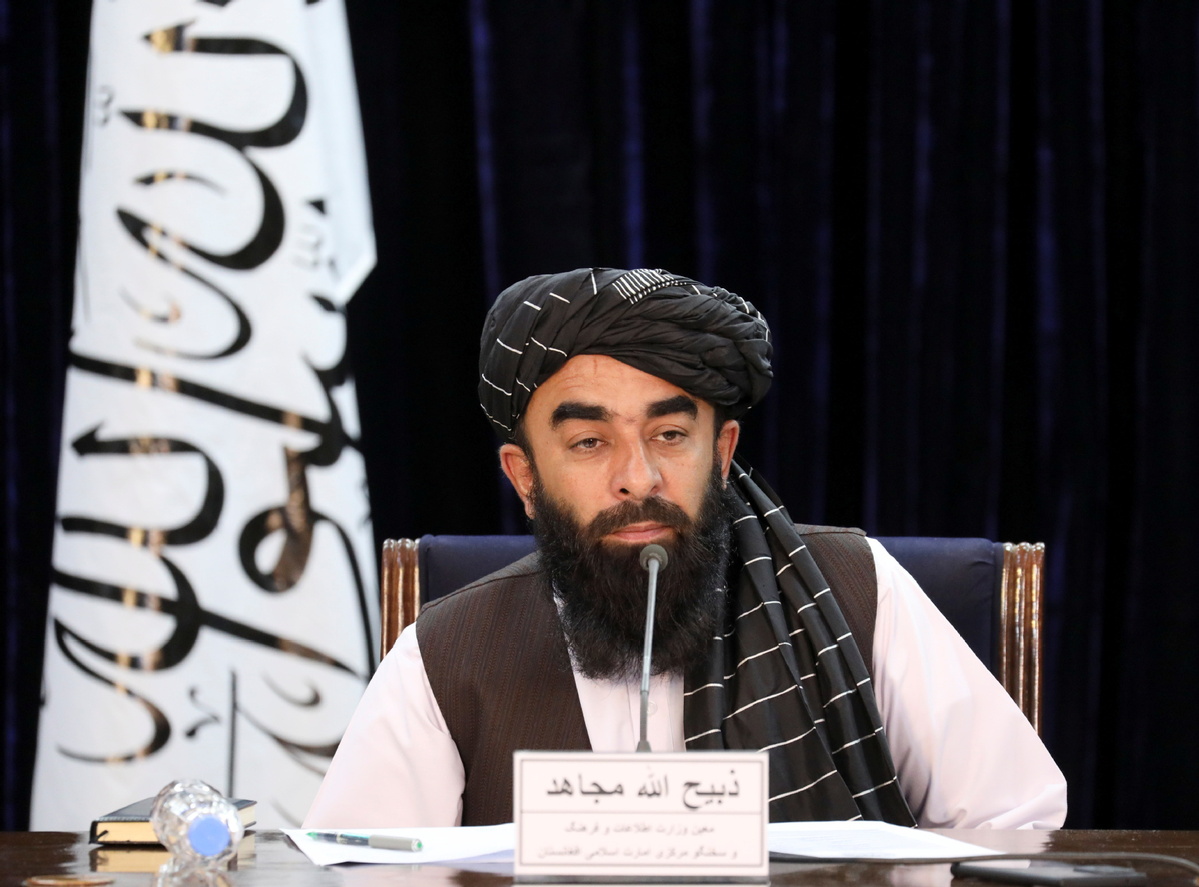
KABUL - Taliban spokesman Zabihullah Mujahid has confirmed the clash between border forces of Iran and Afghanistan and described the incident as a "misunderstanding."
According to media reports, a clash broke out between the border forces of the two countries at a border point between Iran and Afghanistan's western Nimroz province.
"The clash in border area of Kang district in Nimroz province between border forces of Afghan and Iran was a misunderstanding at local level and has been solved," Mujahid said in his twitter account on Wednesday local time.
"To prevent such incident in future, the leadership of the Islamic Emirate has issued necessary directives," Mujahid said.

UNITED NATIONS - The United Nations and its partners are distributing winter clothing, emergency shelter, heating, fuel and rent support for tens of thousands of people in Afghanistan, UN humanitarians said on Tuesday.
"Previous-year trends indicate that in November, cases of hypothermia, acute respiratory infections and death directly and indirectly associated with cold start to increase," the UN Office for the Coordination of Humanitarian Affairs (OCHA) said.
The world organization and partners reported that 23,800 people received winterization assistance across 32 of Afghanistan's 34 provinces between Sept 1 and Nov 15, the office said. The recipients got heating/fuel assistance and winter clothing through cash modalities and in-kind blanket distributions as some temperatures plunged below freezing.
By Monday, the United Nations completed distributing winterization assistance to 32,200 people in Kunar, Nangarhar and Nuristan provinces, OCHA said. In addition, humanitarian partners are responding with aid.
The world body began distributing winterization cash assistance on Monday in Jawzjan Province to cover 1,750 people, OCHA said. The program focuses on internally displaced and drought-affected people, returnees, vulnerable host communities, female- and child-headed households, the elderly and people with disabilities.
The 2021 Afghanistan Flash Appeal has reached 112 percent or $677 million. The different Humanitarian Response Plan is 84 percent funded at $729 million.
"Humanitarians are grateful for the generous contribution by the donor community," the office said. Some financial commitments have not been translated into actions on the ground due to financial system challenges amid Afghanistan's cash and liquidity crisis.
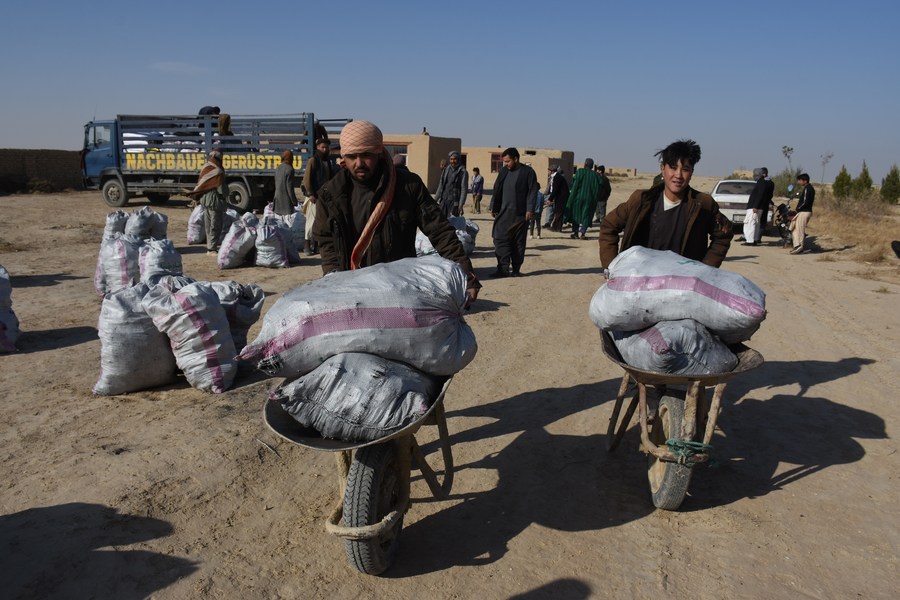
Afghanistan will seek good relations with other countries, the acting prime minister said in an address that sought to ease concerns abroad about Taliban control while appealing for humanitarian assistance.
Mullah Hassan Akhund, in his first televised speech as the most senior leader in the country's interim administration, on Saturday said: "The Islamic Emirate wants to have good relations, economic ties and coexist with all countries."
Speaking on Radio Television of Afghanistan, Hassan Akhund added: "Afghanistan will not interfere in internal affairs of any country, it is not our policy."
He said the new administration will not allow anyone to use Afghan soil to commit acts against another country.
Responding to concerns expressed since the Taliban's takeover of Afghanistan in August, the acting prime minister spoke of the government's aim to protect the rights of women.
"The Islamic Emirate respects the rights of education for women and girls," Hassan Akhund said. Women will be provided with their own space for their studies based on Islamic laws, he said.
Hassan Akhund also urged the international community to restore humanitarian assistance to the war-ravaged country.
"We ask all the international charity organizations to not withhold their aid and to help our exhausted nation … so that the problems of the people can be solved," Hassan said.
Afghanistan, which has relied on foreign aid for decades, has been experiencing rising inflation and unemployment and its banking sector is struggling. Adding to the strains is that the United States has yet to unfreeze about $10 billion of assets held in its reserves on behalf of Kabul.
Afghan Foreign Ministry spokesman Abdul Qahar Balkhi said a delegation led by acting Foreign Minister Mawlavi Amir Khan Muttaqi has been in the Qatari capital Doha since Friday for talks with US officials. The discussions were due to end on Monday.
The Taliban-led administration has repeatedly asked the US to unfreeze the Afghan assets, and to not attach political issues to humanitarian aid. Muttaqi wrote an open letter to the US Congress about the assets. The details of the letter were released on Nov 17.
"The fundamental challenge of our people is financial security and the roots of this concern lead back to the freezing of the assets of our people by the American government," he said in the letter.
A report released by the United Nations World Food Program last month said that more than half of Afghanistan's population of 22.8 million people were facing acute food insecurity. Some 3.2 million children aged under 5 are expected to suffer from acute malnutrition by the end of this year.
"The world owed its support to ensure that they (the people of Afghanistan) can live in a peaceful and stable environment after years of constant conflict," Pakistani Prime Minister Imran Khan told a meeting of the Apex Committee of the Afghanistan Inter-Ministerial Coordination Cell in Islamabad on Nov 22.
An official document said that Khan "ordered an immediate shipment of in-kind humanitarian assistance worth 5 billion Pakistani rupees ($28.5 million), which will comprise food commodities including 50,000 metric tons of wheat, emergency medical supplies, winter shelters, and other supplies" to Afghanistan.
Pakistan approved a reduction in tariffs and sales tax that had been applied on imports from Afghanistan, and instructed authorities to restore bus services between the city of Peshawar and Jalalabad across the border.
Pakistani Information Minister Fawad Chaudhry said a corridor had been approved for supplies of food aid coming from India. "We think the people in Afghanistan should be helped in any way on humanitarian grounds," Chaudhry said.
Salman Bashir, a former foreign secretary of Pakistan and former ambassador to China, called the approval "exceptional".
"This is a major gesture, given the fact that (Pakistan's) relations with India are at the lowest ebb," he said.
Bashir said Pakistan hopes the urgency of the situation will not be lost on Western countries, which "have a moral obligation to assist the people of Afghanistan at this juncture".
Political prejudices and preferences "should not override the urgent considerations of averting famine and a grave humanitarian disaster in Afghanistan", he said.
Imtiaz Gul, executive director of the Center for Research and Security Studies in Pakistan, said his country has been "doing whatever it could to facilitate Afghanistan and its people after having hosted over 3 million refugees until 2015 and 2016".
The US-led freezing of assets and halting of international financial transactions with Afghanistan have put the economy under extreme pressure, the scholar said.
Xinhua contributed to the report.

KABUL - Afghanistan's Taliban government announced a ban on the use of foreign currencies on Tuesday.
In a press statement, Taliban spokesman Zabiullah Mujahid declared that from now on anyone using foreign currency for domestic business would be prosecuted.
"The economic situation and national interests in the country require that all Afghans use the Afghani currency in every transaction," he said.
AFP
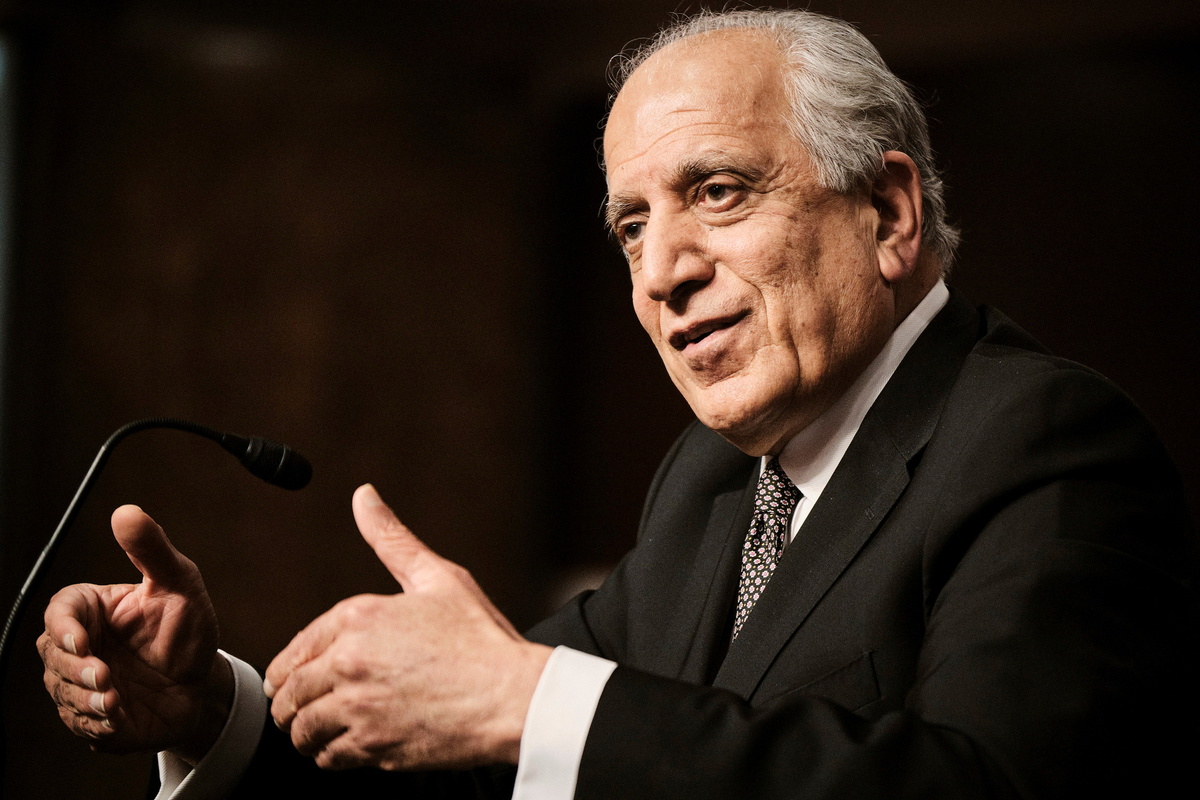
WASHINGTON — The US special envoy for Afghanistan is stepping down following the chaotic American withdrawal from the country, the State Department said Monday.
Zalmay Khalilzad will leave the post this week after more than three years on the job under both the Trump and Biden administrations. He had been criticized for not pressing the Taliban hard enough in peace talks begun while Trump was president but Secretary of State Antony Blinken thanked him for his work.
"I extend my gratitude for his decades of service to the American people," Blinken said of Khalilzad, a former US ambassador to the United Nations and Afghanistan. Khalilzad had initially planned to leave the job in May after Biden's announcement that the US withdrawal would be completed before the 20th anniversary of the 9/11 attacks in September. However, he was asked to stay on and did so.
Khalilzad had served as the special envoy for Afghan reconciliation under both the Trump and Biden administrations since September 2018, when the-Secretary of State Mike Pompeo brought him on board to lead negotiations with the Taliban and the Afghan government. An Afghan native, Khalilzad was unsuccessful in getting the two sides together to forge a sharing deal but he did negotiate a US agreement with the Taliban in February 2020 that ultimately led to the end of America's longest-running war.
The agreement with the Taliban served as the template for the Biden administration's withdrawal of all US forces from Afghanistan, which many believe was conducted too hastily and without enough planning. Thousands of Afghan citizens who worked for US forces there over the past two decades were left behind in the rush to leave as were hundred of American citizens and legal residents.
President Joe Biden and his aides frequently said the agreement that Khalilzad negotiated tied their hands when it came to the pullout and led to the sudden takeover of the country by the Taliban, although administration critics noted that Biden had abandoned the "conditions-based" requirements for a complete US withdrawal.
In interviews and in his resignation letter described to The AP, Khalilzad noted that the agreement he negotiated had conditioned the final withdrawal of US forces to the Taliban entering serious peace talks with the Afghan government. He also lamented that those negotiations and consequently the withdrawal had not gone as planned.
Despite the criticism, Khalilzad remained on the job, although he skipped the first high-level post-withdrawal US-Taliban meeting in Doha, Qatar earlier this month, prompting speculation he was on his way out. Khalilzad will be replaced by his deputy Thomas West, who led the US delegation to that last round of talks in Doha.
However, the US will not be sending a representative to a Russia-hosted conference on Afghanistan this week, the State Department said. Speaking before Blinken's announcement of Khalilzad's departure, department spokesman Ned Price cited "logistics" as the reason the US would not participate in the Moscow talks.
Khalilzad said in his resignation letter that after leaving government service he would continue to work on behalf of the Afghan people and would offer his thoughts and advice on what went wrong in Afghanistan and the path forward.
Agencies via Xinhua
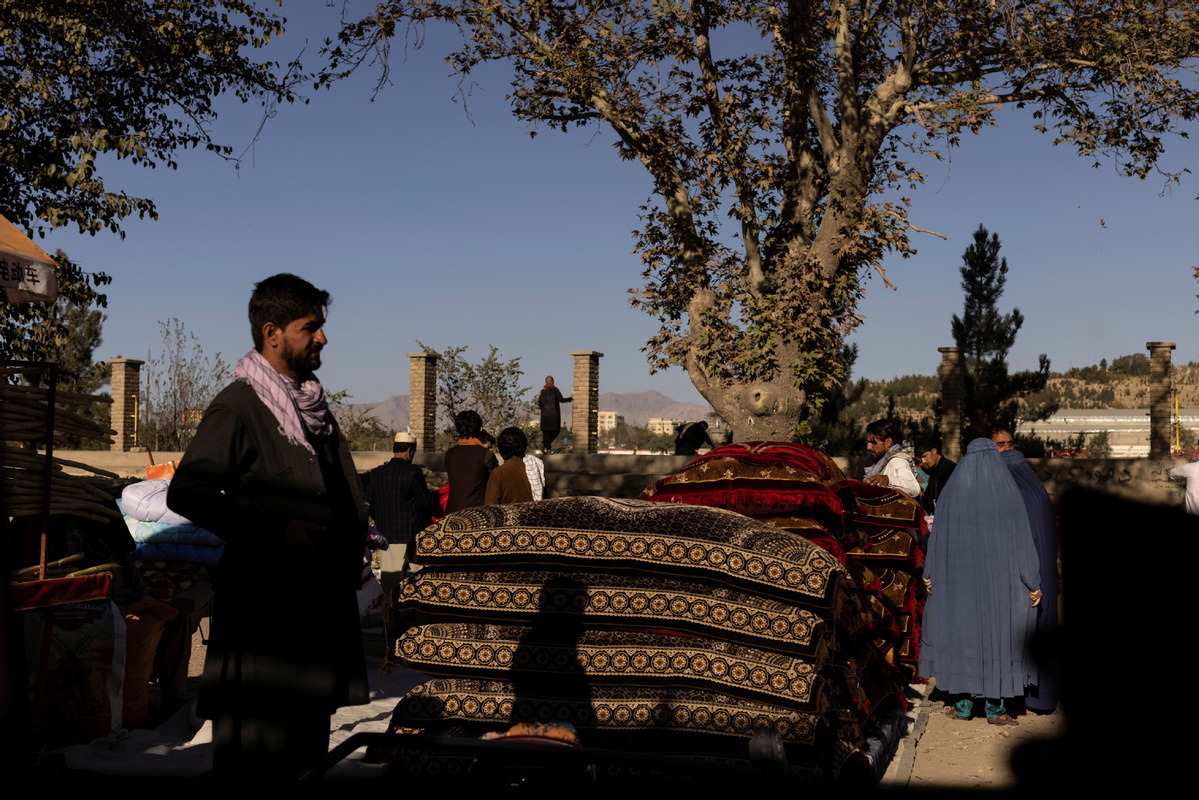
Concerns are growing over the United States' refusal to release the bulk of the $9.5 billion in reserves deposited abroad by the Afghan central bank.
The world should make an effort to enable the Taliban government to access these funds and help stave off an economic collapse in Afghanistan, state leaders said. They were joined by diplomats and scholars in advocating for the Taliban's access to these funds.
Turkey's Foreign Minister Mevlut Cavusoglu said on Thursday: "Afghanistan's economy should not collapse. That is why countries which have frozen Afghanistan's assets abroad should be more flexible so that salaries can be paid."
Cavusoglu made the comment while hosting Afghanistan's acting foreign minister Amir Khan Muttaqi in Ankara, the Al Jazeera network reported.
Afghan officials have said the US is holding about $7 billion of the Afghan central bank's overseas reserves. Officials in the US have not stated a figure.
Speaking after the closed-door talks in the Turkish capital, Cavusoglu urged international engagement with the Taliban. "We have told the international community about the importance of engagement with the current Taliban administration."
The meeting followed talks by Taliban leaders with representatives of the United States, the European Union and some European nations in Qatar recently.
Amina Khan, director of the Centre for Afghanistan, Middle East and Africa at the Institute of Strategic Studies in Islamabad, said it is essential that the world not only release the Afghan funds but also provide developmental and economic assistance "as the basic needs of Afghanistan people are not being met". As many as 14 million Afghans are experiencing hunger.
Caring about welfare
Salman Bashir, a former foreign secretary of Pakistan and former ambassador to China, said it seems for now that these reserves will stay blocked, with impossible conditions set for their release.
The world should care about the welfare of the Afghan people, he said.
On Tuesday, leaders of the Group of 20 nations discussed issues concerning Afghanistan in a virtual meeting. The European Union pledged aid of 1 billion euros ($1.2 billion) to Afghanistan and neighboring countries. "We must do all we can to avert a major humanitarian and socio-economic collapse in Afghanistan," Ursula von der Leyen, the president of the European Commission, said in a statement.
Earlier this month in Doha, Muttaqi urged the US to unfreeze the reserves in his first in-person meeting with the US delegation since late August. The US has shown no signs that it will release the money.
Afghanistan's neighbors have also supported calls for the US-held funds to be released. A number of countries, the World Bank and the International Monetary Fund halted aid to Afghanistan in August following the Taliban's seizure of Kabul.
Last month, both Pakistan and Qatar called on the US to unfreeze the assets.
Uzbek President Shavkat Mirziyoyev also urged other countries to release Afghanistan's assets during a meeting of the Shanghai Cooperation Organization in September.
Mustafa Hyder Sayed, executive director of the Pakistan-China Institute, said Afghan funds in New York are being used to serve political interests in the US.
Agencies contributed to this story.
KANDAHAR, Afghanistan - A bomb blast inside a mosque in Kandahar city, capital of southern Kandahar province, on Friday, has caused concern among war-weary Afghans who are praying for the return of lasting peace in their war-torn country.
In the explosion, which targeted Imam Barga Fatimia, a Shiite mosque in Kandahar city, 16 worshippers were killed and 32 others injured, local media reports said.
However, locals said that the number of casualties is higher than reported.
Interior Ministry spokesman Qari Sayed Khosti has confirmed the blast but didn't provide more details.
This is the second attack against a Shiite mosque in Afghanistan over the past one week.
In the previous attack, which happened in the northern Kunduz city last Friday and the hardliner Islamic State group claimed responsibility for, reportedly killed more than 50 worshippers and injured scores of others.
Some eyewitnesses, according to local media, believed that one attacker blew himself up next to the gate of Imam Barga Fatimia and thus facilitated two more suicide-attackers to enter the mosque and detonated themselves, inflicting the casualties.
Imam Barga Fatimia with a capacity of 4,000 worshippers is among the biggest mosques in Kandahar, and the casualties could be higher as hundreds of people gathered there to offer their Friday prayers, according to unnamed eyewitnesses.
"Terrorist attack on a mosque which is the safest place in Islam indicates that the war is not finished in Afghanistan and more attacks would happen in the future to claim more lives," observed an eyewitness but refused to be named.
Although no group has claimed responsibility, some locals did not rule out the involvement of Daesh or the hardliner Islamic State group in the deadly attack on the mosque.
"The activities of the Islamic State group in Afghanistan speak of the presence of militant groups in the country that want to continue the war," university professor Hekmatullah Mirzada told local media.
However, Zabihullah Mujahid, spokesman for the new Afghan government in Kabul, has downplayed the presence of the hardliner group, saying "Daesh is not a serious threat and the Islamic Emirate can control it."
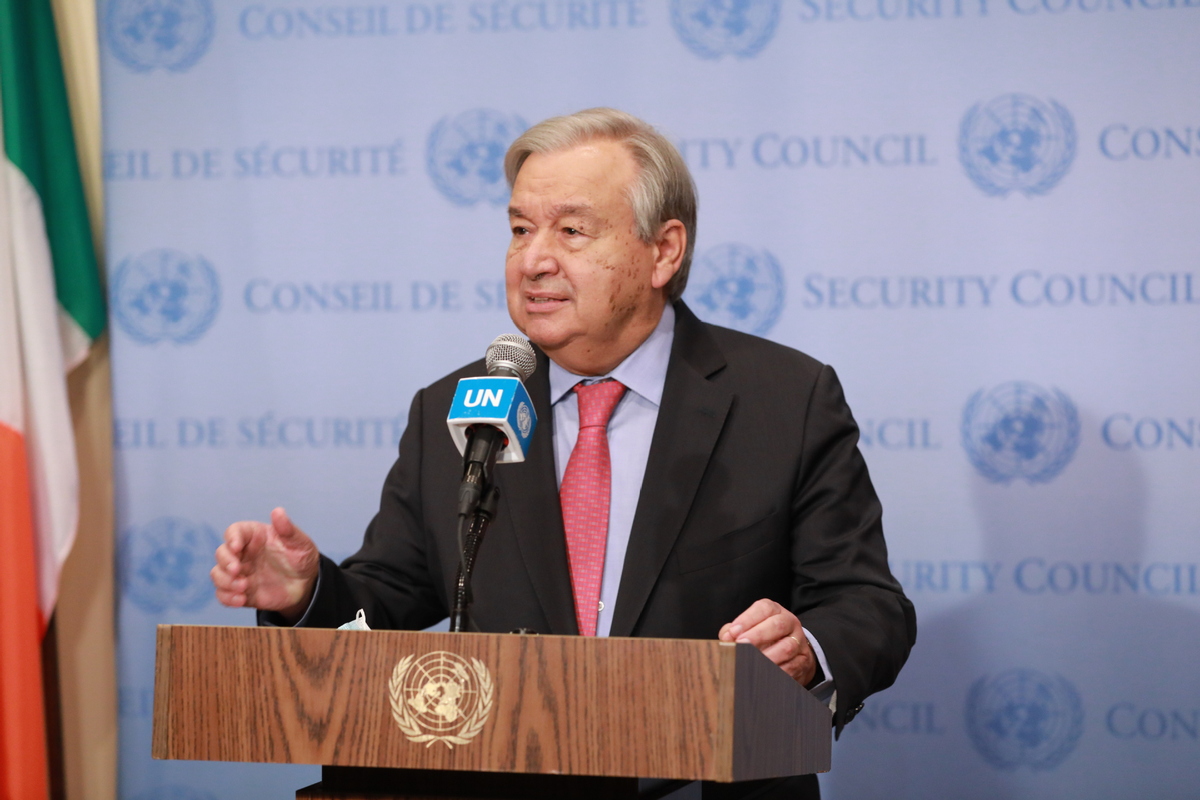
UNITED NATIONS - UN Secretary-General Antonio Guterres on Monday called for the injection of liquidity to keep the Afghan economy afloat.
In addition to humanitarian aid, the international community needs to act to prevent the economic collapse of Afghanistan, he told reporters.
Even before the Taliban takeover in August, Afghanistan's fragile economy, which has been kept afloat by foreign aid over the past 20 years, suffered from the impact of drought and COVID-19. Right now, with assets frozen and development aid paused, the economy is breaking down. Banks are closing, and essential services, such as health care, have been suspended in many places, he noted.
"We need to find ways to make the economy breathe again. And this can be done without violating international laws or compromising principles. We must seek ways to create the conditions that would allow Afghan professionals and civil servants to continue working to serve the Afghan population," he said.
"I urge the world to take action and inject liquidity into the Afghan economy to avoid collapse," Guterres said.
This is a make-or-break moment, wared Guterres. "If we do not act and help Afghans weather this storm, and do it soon, not only they but all the world will pay a heavy price."
Without food, without jobs, without their rights protected, more and more Afghans will flee their homes in search of a better life. The flow of illicit drugs, criminal and terrorist networks will also likely increase. This will not only badly affect Afghanistan itself, but also the region and the rest of the world, he warned.
Guterres said the issue of injecting liquidity should be treated independently of other issues, such as the questions of recognition or nonrecognition of a government in Afghanistan, the question related to sanctions, and the questions related to frozen assets.
"There are many questions of these that, obviously, the international community will be discussing with the Taliban and that will require that the Taliban abide by a number of important aspects, be it related to human rights and the rights of women and girls, in particular, be it in relation to the question of terrorism, be it ... the inclusivity of the government," he said.
Independently of those measures, there are forums to inject cash inside the economy through different entities, through nongovernmental organizations (NGOs), through UN agencies to allow for the people to receive assistance, he said. "And this is what we have been asking."
There is a need to find ways -- on the basis of respect for international law and principles -- to inject liquidity for the economy not to collapse and for the people not to suffer tremendously, he said. "The Afghan people cannot suffer a collective punishment because the Taliban misbehave."
The diplomatic recognition of the Taliban and the injection of liquidity are completely different things, said Guterres.
The World Bank can create a trust fund and that trust fund can pay directly to Afghan people in need. The UN Development Programme has a trust fund that can pay directly to people in need or organizations in need. And there are many NGOs operating in Afghanistan, he said.
"So, we need to inject cash in the economy. I'm not saying that I'm asking the international community to give money to the Taliban or to the present authorities. No. We need to inject cash in the economy. We need to make the economy breathe. We need to allow people to survive. That is our concern."
While the international community has consensus on humanitarian aid, things in relation to the injection of liquidity into the Afghan economy are moving too slowly, said Guterres.
The main responsibility for finding a way back from the abyss lies with those that are now in charge in Afghanistan, he said.
Since their takeover, the Taliban have -- at various times -- promised Afghan citizens, including women, children, minority communities, former government employees, that they would protect their rights. Central to those promises was the possibility of women to move, work and enjoy their basic rights, and for girls to have effective access to all levels of education, the same as boys, he said.
"Gender equality has always been an absolute priority for me. ... I am particularly alarmed to see promises made to Afghan women and girls by the Taliban being broken," said Guterres. "Broken promises lead to broken dreams for the women and girls of Afghanistan."
Women and girls need to be the center of attention. Their ability to learn, work, own assets, and live with rights and dignity will define progress. Eighty percent of Afghanistan's economy is informal, with a preponderant role of women. Without them, there is no way the Afghan economy and society will recover, he said. "I strongly appeal to the Taliban to keep their promises to women and girls and fulfill their obligations under international human rights and humanitarian law."
The United Nations is permanently engaging with the Taliban on the safety and security of its staff, humanitarian assistance and unhindered access for all, including female staff, and human rights with particular focus on women and girls' rights, he said.
The humanitarians have been acting with the cooperation of the Taliban, who have progressively granted access to the areas requested and provided security when needed. The number of incidents during humanitarian operations has been in constant decline, he noted.
The United Nations is engaging with the Taliban and progress is being made, said Guterres.
He gave an example of the UN engagement with the Taliban for its female staff to have full and unimpeded work in relation to humanitarian aid.
"Now, we have been engaging the Taliban province by province, day by day. And the result of that effort, in the month of September, is the following: we managed to reach full agreement with the Taliban on this freedom in six provinces, against three in the beginning of the month; we have partial agreement in 20, instead of 16 in the beginning of the month; we have no agreement in four, against six in the beginning of the month; and there are four in which we have not yet had the possibility to engage, against eight in the beginning of the month."
"This is daily work, area by area, fighting for the rights of each woman, sometimes one by one. But this is our engagement to our staff and to the women and girls in Afghanistan in general," he said. "We might have difficulties. We might fail here and there. But one thing I can promise: we will not give up."
The humanitarian crisis is growing in Afghanistan, with at least 18 million people -- half of the country's population -- needing help. UN agencies and humanitarian NGOs in Afghanistan are in a race against time to deliver life-saving aid to crisis-affected people and pre-position supplies ahead of winter, he said.
Despite financial shortfalls, logistical challenges, and an increasingly complex geopolitical situation, the United Nations is undertaking a massive humanitarian operation in the country.
In September alone, more than 3.8 million people received food assistance; 21,000 children and 10,000 women received treatment for acute malnutrition; 32,000 people received non-food items, including blankets and warm clothes for winter; 10,000 children were reached with community-based education activities; 450,000 people were reached with primary and secondary health care; 160,000 farmers and herders were provided with livelihoods support; 12,000 people received emergency psycho-social and mental health support; 186,000 drought-affected people received water; and 150,000 people received hygiene promotion and hygiene kits, he said.

KABUL - The Ministry of Foreign Affairs of the caretaker government in Afghanistan said on Monday that talks with the United States will continue if necessary.
Over the weekend, a Taliban delegation led by Amir Khan Muttaqi, acting foreign minister of the caretaker government, met with a US interagency delegation in Doha, Qatar.
"The Two-day dialogue between the delegations of the Islamic Emirate of Afghanistan (IEA) and the United States of America went well. Political issues were discussed in detail during the meeting and full implementation of the Doha agreement was considered by the Islamic Emirate as the best way for resolving problems," the ministry said in a statement.
The US representatives, according to the statement, said that the United States will give humanitarian assistance to Afghans and will provide facilities for other humanitarian organizations to deliver aid.
"Humanitarian assistance should not be linked with political issues," the statement noted.
The IEA has welcomed US assistance and it will cooperate with charitable groups in delivering humanitarian assistance, and will facilitate principled movement of foreign nationals, the statement said.
"Detailed discussions were held during the meeting about all relevant issues. And efforts should be exerted to restore diplomatic relations to a better state," it said, adding "The meeting in which talks were candid was considered a good opportunity of understanding" and it was agreed that such meetings will continue to be held in the future if necessary.
The meeting marked the first in-person gathering between the United States and the Taliban since the US withdrawal from Afghanistan at the end of August.
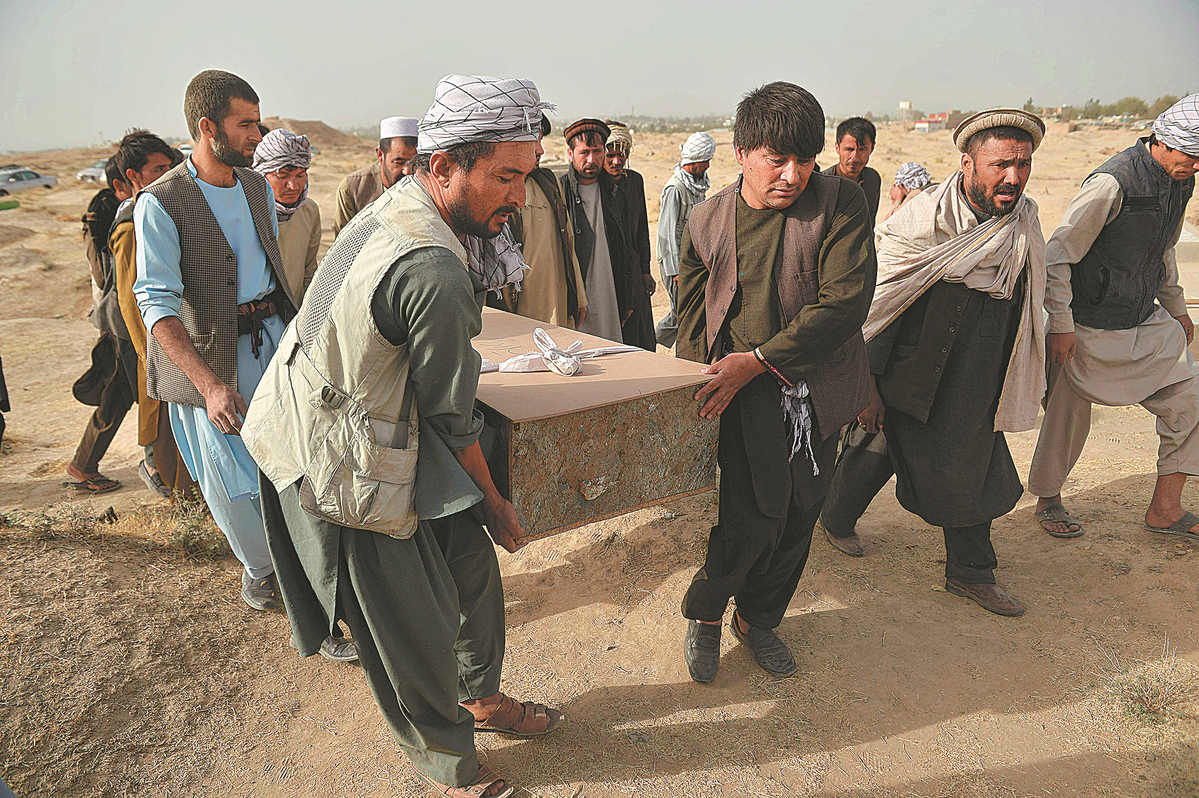
US urged to lift ban on Afghan central bank and not to interfere with its affairs
DOHA-The Afghan Taliban said a high-level delegation of its government had met a US delegation in the Qatari capital, Doha, the first such meeting since the United States withdrew from Afghanistan in late August and the first foreign visit by the Taliban government officials.
The two sides discussed opening a new chapter of bilateral relations, and the Taliban officials called on the US to lift the ban on frozen assets in the Afghan Central Bank, Amir Khan Muttaqi, acting foreign minister of the newly formed administration, said on Saturday.
The Taliban delegation also urged the US to respect the sovereignty of Afghanistan's airspace and not to interfere in its affairs, he said, stressing the focus was on humanitarian aid and implementing all provisions of the Doha Agreement concluded between the two sides in February last year.
"We clearly told them that trying to destabilize the government in Afghanistan is good for no one," Muttaqi told the Afghan state news agency Bakhtar after the talks.
"Good relations with Afghanistan are good for everyone," he said in a recorded statement translated by Agence France-Presse. "Nothing should be done to weaken the existing government in Afghanistan which can lead to problems for the people."
In the coming days the delegation will meet representatives of the European Union to discuss the latest developments, Muttaqi said.
The Twitter account of a Taliban spokesman said that on Friday a high-level delegation led by Muttaqi headed to Doha to meet Qatari officials and representatives of other countries on the current political situation and the country's external relations.
Qatar plays a major role in the Afghan issue, having facilitated the evacuation and transfer of tens of thousands of people from Kabul, helping reopen Kabul Airport to receive aid and flights, and providing financial aid to Afghanistan estimated at $50 million, according to official statements.
Since 2013 the Taliban have maintained a political office in Doha, and over the years it has been the venue of negotiations between the Taliban and the US and is where the peace agreement between the two sides was signed in February last year that provided for the withdrawal of foreign forces from Afghanistan.
Deadly attack
The meeting came a day after a deadly suicide attack on a Shiite mosque in the Afghan province of Kunduz in which at least 46 were killed and many wounded.
The Islamic State group claimed responsibility for the bombing.
Matiullah Rohani, director of culture and information in Kunduz for Afghanistan's new Taliban government, told AFP that the incident was a suicide attack and that at least 46 people had died and 143 were injured. Two health officials told Reuters as many as 80 people may have died.
"A crime has been committed in the Khan Abad area of Kunduz city," the Taliban spokesman Zabihullah Mujahid told Chinese news television CGTN on Friday.
"An explosion took place in a mosque of Shiite compatriots during Friday prayers," Mujahid said. "A number of people were killed and injured."
The Taliban strongly condemned the attack, he said, which met with broad international condemnation, the United Nations Secretary-General, Antonio Guterres, calling for the perpetrators to be brought to justice.
Friday's attack was the deadliest in the country since the US and NATO troops left Afghanistan and the Taliban took control of the country.
An explosion outside a mosque in Kabul killed eight people on Oct 3. Twenty others were injured in the explosion, for which the ISIS claimed responsibility.
Xinhua - Agencies
